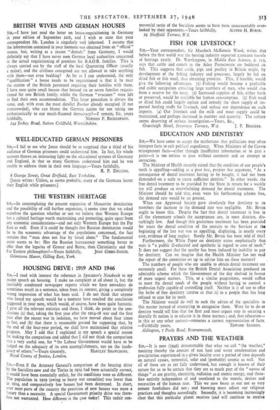FISH FOR LIVESTOCK?
Sta,—Your correspondent, Sir Murdoch McKenzie Wood, writes that before the first world war the herring industry exported 2,000,000 barrels of herrings yearly. Dr. Worthington, in Middle East Science, p. 1t9, says that cattle and camels in the Aden Protectorate are foddered on fish. This suggests that cattle, pigs and poultry in Britain might, by development of the fishing industry and processes, largely be fed on dried fish or fish meal, thus obtaining proteins. This, if feasible, would give the following advantages. (a) Fishing would become a profitable and stable occupation attracting large numbers of men, who would also form a reserve for the navy. (a) Increased supplies of fish, either fresh or preserved, would be available for human consumption. (3) Fish meal or dried fish could largely replace and remedy the short supply of im- ported feeding stuffs for livestock, and reduce our dependence on such imports. (4) Our livestock and the milk and meat supply could be maintained, and perhaps increased in number and quantity. The subject seems deserving of serious investigation.—Yours, &c., Grantleigh Hotel, Inverness Terrace, W.2. J. P. BRANDER.


























 Previous page
Previous page